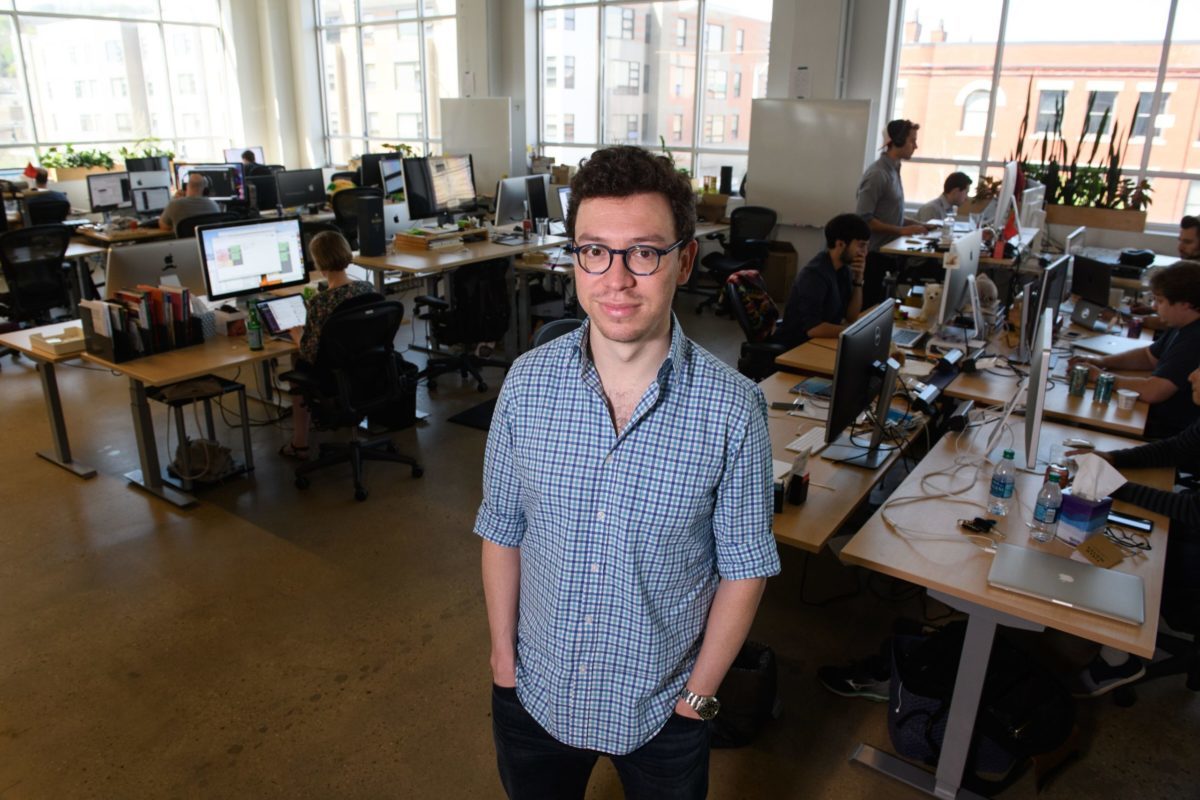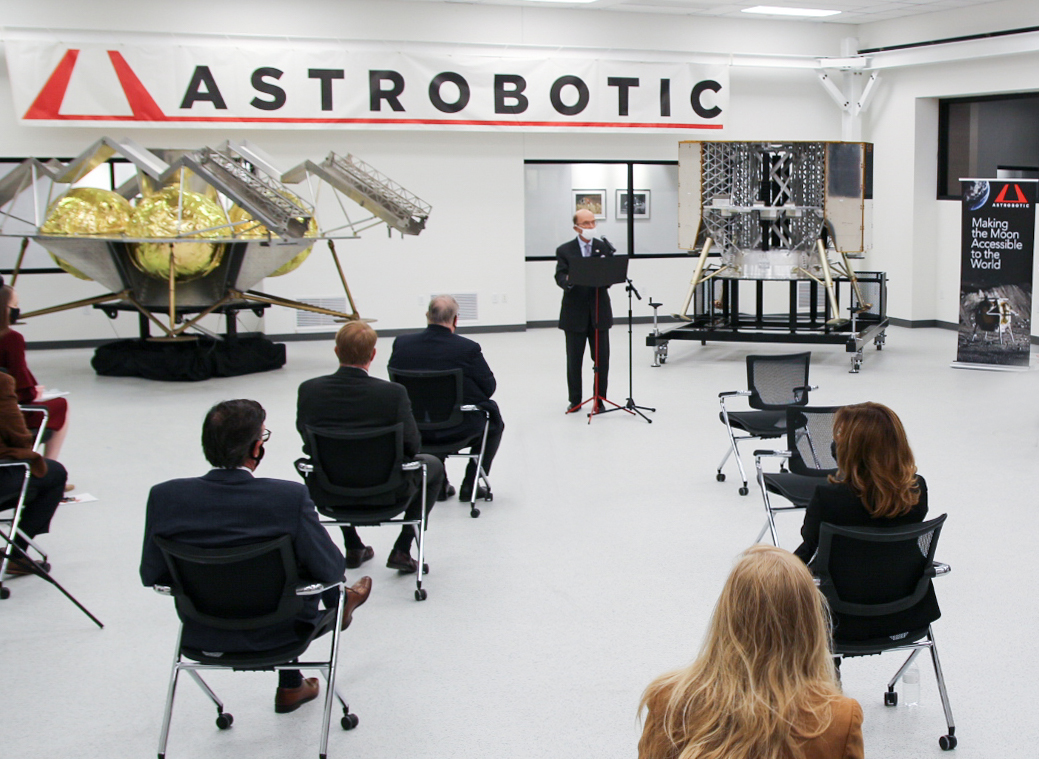
This editorial series is underwritten by Pittsburgh Innovation District. This article was not reviewed before publication. Learn more here and sign up for our weekly newsletter on jobs in the region here.
Pittsburgh has earned a reputation as a blue-collar city, with companies that thrive due in large part to the region’s storied work ethic.
Over the last three decades, as the Pittsburgh region has tried to rebuild and rebrand as a technology hub, startups have learned what it takes to build a new company in the Steel City, and gained access to plenty of programs and incubators to nurture fledgling startups. But for companies that have raised a few rounds of capital and are in growth mode, the roadmap is a lot less clear.
John Thornton, CEO of space robotics company Astrobotic, told Technical.ly that successful Pittsburgh startups have to be more resilient than they might have to be in a city with a more robust startup ecosystem. Founded in 2007, the company’s trajectory has moved firmly into growth phase: It has raised $212 million in funding, and has more than 30 prior and ongoing contracts with NASA and commercial technology companies. In a contract worth $199.5 million, NASA in 2020 chose Astrobotic to carry a water-hunting rover to the Moon in 2023 as part of the agency’s Commercial Lunar Payload Services. In October, the 130-employee company moved into a new 47,000-square-foot headquarters in the city’s Manchester neighborhood.

John Thorton.
“Because there is not a lot of venture capital here, and the business community here tends to be pretty conservative and traditional, if you are a new company here you pretty much have to make it on your own,” Thornton said. “You pretty much have to be generating your own customers and generating your own business.”
A lot of the time, he added, that business is from outside the area. Thornton said he has tried to use his platform to encourage more established businesses in town to talk to the innovation community, and the smaller companies.
“Because what happens is, they partner with companies outside of Pittsburgh who then make a ton of money in the partnership and do really well, and Pittsburgh misses out on that opportunity and they move out of the city,” Thornton said.
Scaling investment
Growth-stage companies are typically those that have a proven product, have found their market fit and are working to scale up. Many in Pittsburgh’s startup community dispute whether the region suffers from a funding gap between young startups and startups in growth mode. But as Thornton correctly noted, there are fewer venture capital options in Pittsburgh than startup hubs like Silicon Valley or Boston.
That’s not to say there’s no VC activity in Pittsburgh. As Rich Lunak, CEO of early-stage investor Innovation Works, points out, 300 venture funds from around the world have invested in Pittsburgh-area companies over the last five years. According to a recent report from Ernst & Young and Innovation Works, Pittsburgh technology companies raised nearly $1 billion in 2020. Of that total, roughly $440 million came from venture capital funds, $36.9 million from angel investments, and $466.4 billion from “corporate and other.” Seed funds and accelerators accounted for just under $49 million.
For a sector to raise that much amid a global pandemic is certainly a positive sign. But a closer look at the numbers shows nearly half of the $1 billion total came from one company, when autonomous vehicle company Aurora acquired Uber ATG, and self-driving unit’s parent company Uber invested $400 million into Aurora. Lunak said he thinks 2020’s figure would have been significantly higher if not for the pandemic (In 2019, Pittsburgh’s tech startups raised a total of nearly $3 billion).
The city's growth funding totals are trending up, but the local supply remains low.
“So I think it speaks to the tenacity of our entrepreneurial community, and the tremendous momentum that we have as a region,” Lunak said. “If you were to look at the trend over the last 10 years, there is terrific growth in both the average dollars invested as well as the number of companies raising funds.”
The city used to see several smaller rounds, but very few companies that raised anywhere north of $10 million, Lunak added.
“Now, we have a lot of these growth equity and expansion rounds, which bodes well for the region that we have, high-growth startups that are getting scale and really having a much broader impact on the Pittsburgh region,” he said.
The report also details a couple of multi-year funding commitments to fuel growth: It lists $200 million from Ford’s $1 billion 2017 investment in autonomous driving company Argo AI, described as a commitment of $1 billion over five years (2017-2022). And the 2020 figure also includes $300 million of a $600 million investment in Aurora, made in 2019 by Amazon, Sequoia Capital and T. Rowe Price.
However, as the report notes, in Pittsburgh “the estimated supply of local VC funding remains very low.” None of the new funds that emerged in the past several years closed on significant or new capital in 2020, and several big existing funds, including Birchmere Ventures, Draper Triangle Ventures and Riverfront Ventures distributed COVID-19 relief funds provided by the state.
It’s also worth noting that among the Pittsburgh growth startups that flourished in 2020, most have a unique value proposition and arguably would have thrived anywhere. Aurora acquired Uber ATG. Language learning app company Duolingo had already become Pittsburgh’s first unicorn tech startup, reaching a valuation of $1.5 billion following a $30 million funding round in late 2019.
Growing a workforce
Perhaps one crucial element of success for growth companies in Pittsburgh area is the relationships with local universities like Carnegie Mellon University (CMU) and the University of Pittsburgh. Over the past few decades, Pittsburgh’s universities and tech transfer programs have played a big role in some of its most successful startups. Duolingo CEO Luis von Ahn is a CMU alum, and being able to work with and recruit local computer science graduates has been a big part of the company’s success, said Chief People Officer Christine Rogers-Raetsch.
“This was certainly the case for Duolingo having spun out of CMU and continuously attracting top talent from CMU and other local universities,” she said.
Based in the city’s East Liberty neighborhood, about 20% of Duolingo’s more than 350 employees are CMU alumni, and 20% are on H-1B worker visas. Duolingo has touted its Pittsburgh location as a benefit when trying to recruit talent from the Bay Area.
“I don’t see this going away anytime soon, especially knowing the appetite for strong tech talent and being able to recruit right in your backyard from among the best computer science programs in the world,” Rogers-Raetsch said.

Duolingo CEO Luis von Ahn. (Courtesy photo)
But growth looks different for every company: Some scale up their production, others expand into new markets, and still others make acquisitions or mergers. Aurora was able to grow significantly during the pandemic, while many other companies scaled back, or stayed in a holding pattern. Along with the Uber ATG deal, Aurora acquired OURS and announced partnerships with Paccar, Toyota, and Volvo.
Gerardo Interiano, Aurora’s VP of government relations, said the company was mindful of supporting its remote workforce, keeping employees safe during the pandemic while at the same time accelerating its progress. And having a strong company culture and sharply focused mission helped guide their decisionmaking.
“Fundamentally, we are a mission-driven company intent on delivering this technology broadly and ensuring transportation is safer, more efficient, and more accessible than ever before,” Interiano said. “Last year, we doubled down on our belief that our technology will not only save countless lives, but will change the transportation ecosystem as we know it today.”
But the companies who are able to grow here are the ones that are built to last, Thornton said.
“The companies that do make it are pretty strong and robust, because they have to be,” he said. “There are no local big investors who are going to bail you out. If you’re making it here, that means it’s because you can.”
Join the conversation!
Find news, events, jobs and people who share your interests on Technical.ly's open community Slack

RealLIST Connectors 2024: Meet 20 leaders spreading innovation throughout Pittsburgh

Is AI really something new — or just the next big technology platform?

This Week in Jobs: Get out there with 22 new job opportunities available to you!

